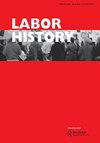韩国学术劳动力市场的变化与劳动斗争
IF 0.7
4区 管理学
Q1 HISTORY
引用次数: 0
摘要
摘要本研究探讨韩国学术劳动市场与劳工斗争的特征与变迁。三个主体(政府、资本和大学)的策略以及由此产生的劳动力反应驱动了学术劳动力市场的演变,这可以基于市场分层、就业状况(终身制与非终身制、全职与兼职)、工资水平和绩效体系的可用性来分析。从20世纪70年代末开始,韩国大学的增长迫使大学大量招聘低薪兼职讲师,导致了学术劳动力市场的分化。1987年民主化运动之后,兼职讲师成立了要求改善劳动条件的团体,但并没有什么变化。1997年金融危机后,资本和政府实施了新自由主义政策,政府和大学实行了工资弹性政策,非终身制专任教师的新类别开始取代终身制专任教师,形成了三级劳动力市场。这加剧了兼职讲师所面临的困难,迫使他们参与到劳动斗争中来。韩国的例子表明,学术劳动力市场是通过相关各方之间的战略互动和冲突而产生、演变和变化的,并提醒我们工人组织能力和应对策略的重要性。本文章由计算机程序翻译,如有差异,请以英文原文为准。
Changes in the South Korean academic labor market and labor struggle
ABSTRACT This study examines the characteristics of and changes in the Korean academic labor market and labor struggle. The strategies of three agents (government, capital, and universities) and the resulting response of labor drive the evolution of the academic labor market, which can be analyzed based on market stratification, employment status (tenured vs non-tenured and full-time vs part-time), wage level, and availability of performance-based systems. The growth of Korean universities starting in the late 1970s, forcing universities to recruit larger numbers of low wage part-time lecturers and resulting in the segmentation of the academic labor market. Following the 1987 democratization movement, part-time lecturers established organizations that called for improvements in labor conditions, but few things changed. After the 1997 financial crisis, capital and the government implemented a neoliberal agenda and the government and universities made wages flexible, and the new category of non-tenured full-time faculty started to replace tenured full-time faculty, creating a three-tiered labor market. This aggravated the hardship that part-time lecturers had faced and drove them to engage in the labor struggle. The Korean example shows that the academic labor market emerges, evolves, and changes through strategic interaction and strife among the parties involved, and reminds us of the importance of workers’ organizational capabilities and counterstrategies.
求助全文
通过发布文献求助,成功后即可免费获取论文全文。
去求助
来源期刊

Labor History
Multiple-
CiteScore
1.00
自引率
28.60%
发文量
44
期刊介绍:
Labor History is the pre-eminent journal for historical scholarship on labor. It is thoroughly ecumenical in its approach and showcases the work of labor historians, industrial relations scholars, labor economists, political scientists, sociologists, social movement theorists, business scholars and all others who write about labor issues. Labor History is also committed to geographical and chronological breadth. It publishes work on labor in the US and all other areas of the world. It is concerned with questions of labor in every time period, from the eighteenth century to contemporary events. Labor History provides a forum for all labor scholars, thus helping to bind together a large but fragmented area of study. By embracing all disciplines, time frames and locales, Labor History is the flagship journal of the entire field. All research articles published in the journal have undergone rigorous peer review, based on initial editor screening and refereeing by at least two anonymous referees.
 求助内容:
求助内容: 应助结果提醒方式:
应助结果提醒方式:


